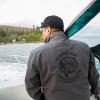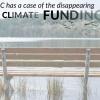This election, vote for a healthier, more just and sustainable future.
Environmental Law Alert Blog
Through our Environmental Law Alert blog, West Coast keeps you up to date on the latest developments and issues in environmental law. This includes:
- proposed changes to the law that will weaken, or strengthen, environmental protection;
- stories and situations where existing environmental laws are failing to protect the environment; and
- emerging legal strategies that could be used to protect our environment.
If you have an environmental story that we should hear about, please e-mail Andrew Gage. We welcome your comments on any of the posts to this blog – but please keep in mind our policies on comments.
I didn’t need the Intergovernmental Panel on Climate Change (IPCC) to release their latest climate assessment report to know that climate change is here now, or that it will only get worse. Did you?
No matter where you live, it’s likely that the climate crisis has been top of mind this summer – especially with the August 9 release of the Intergovernmental Panel on Climate Change (IPCC) report.
Coal’s harms are no secret. Thermal coal (burned to generate power) is the world’s largest source of anthropogenic greenhouse gases, and metallurgic (steelmaking) coal’s impacts on fisheries are well documented.
In recent years, oil and gas companies have tried desperately to “clean up” their images in relation to the environment by referencing policies like carbon taxes or the shift to natural gas as part of the effort to fight climate change.
We feel, in the wake of this year’s heat wave and the loss of the Village of Lytton to wildfire, that the BC government needs to do much more – much more urgently – to protect our communities from climate change.
With BC coming out of the worst heat wave in … well, probably ever, with the Village of Lytton burnt to the ground and the prospect of more wildfires over the summer, let’s ask the question: what should our government be doing to keep us safe from climate change?
On June 9th I appeared as a witness before the Senate Energy, Environment and Natural Resource Committee to speak about Bill C-12, the Canadian Net-Zero Emissions Accountability Act.
“Our ancestors knew that their survival depended on clean water and taking only what was needed. Indigenous peoples lived by the natural laws of the land and waters, and that allowed our societies to thrive.” - Bev Sellars, Elder and former chief, Xat’sull Nation
West Coast’s climate team was talking recently with an Environmental Coordinator with a BC local government when she mentioned – almost casually, although she was clearly upset – that most of the funding that her community has for climate change adaptation and planning had disappeared for next year.










